Our Team
The Simulation Centre is operated by a team of committed professionals with years of experience in the medical simulation field.
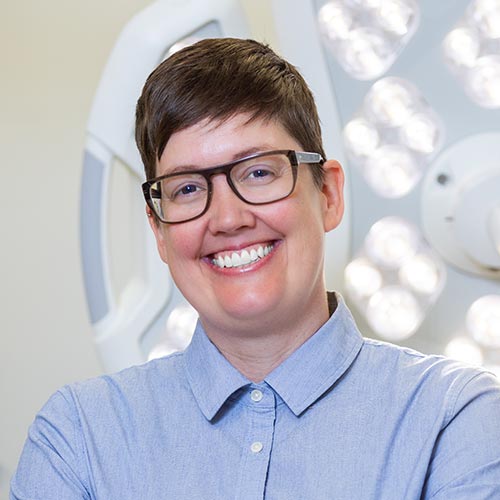

Lindsay (she/her) is a passionate cisgender queer physiotherapist and educator who has worked in various leadership, operational, education and clinical roles in hospital and academic settings over the past 18 years.
In addition to her manager role with Unity Health Toronto’s Simulation Program, Lindsay teaches in the Department of Physical Therapy at the University of Toronto Masters of Physical Therapy Program within its Social, Political, Ethical and Cultural Issues in Health and Healthcare (SPEC) curriculum.
Lindsay is also a Doctorate of Science in Rehabilitation Health and Leadership (DSc. RHL) candidate at Queen’s University. Her research focuses on oppression related to sex and gender, its impact on healthcare, and opportunities to disrupt it. Lindsay is a white, able-bodied settler who grew up middle class and is constantly trying to understand the pervasive effects of privilege in healthcare and society.
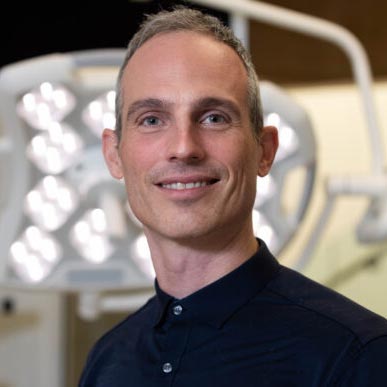

Ryan’s research program explores how health professionals engage in self-regulated learning, with a particular focus on the cognitive, behavioural, and social factors influencing their learning. He uses theories from educational psychology to understand how to conceptualize and measure how learners’ goals, strategies, and beliefs influence their learning processes and outcomes.
The ultimate goal of his research is to translate this understanding to design training environments that prepare clinicians to be effective in their future lifelong learning. He typically situates his studies in the contexts of healthcare simulation and other technology-enabled education, and has also expanded to study how learning in these settings transfers to workplace-based learning.
His additional research interests include: skill retention and transfer, translational simulation, validation and assessment, quality improvement, data-driven health professions education, and experimental research designs.


Caseita is a certified Health Information Management Professional with over a decade of experience in healthcare, and a passion for education and information technology. She holds a Bachelor of Health Administration with a major in Health Information Management (2022), complemented by an advanced diploma in Computer Programming and Analysis (2005). Her educational background also includes certificates in SQL Database Administration (2019) and Health Data Analytics (2016), as well as diplomas in Medical Administration (2012) and Health Information Management (2015). With her strong foundation in information technology, Caseita has recently expanded her skill set by completing the Extended Reality (XR) Development with Unity curriculum at the University of Toronto, becoming a certified XR developer (2023). This achievement aligns with her interest in exploring the potential of VR/AR technology as a teaching modality for healthcare professionals in medical education.
Caseita has contributed to various areas of healthcare, including research, finance, simulation, human resources, and administration. Currently, she plays a key role in overseeing operational, financial, and personnel activities for the day-to-day operations of the Simulation Program across Unity Health Toronto.


Justin has been a member of the Unity Health team since January of 2023 and joined the Simulation Program team in September of 2024 to support the ACLS program. Justin brings a wealth of inter-disciplinary healthcare experience, having previously worked in pharmacy, research, clinical administration, counselling, coordinating medical education, and supporting medical learners at Providence Healthcare.
Justin holds an Honours Undergraduate Degree in Psychology (2018), and is passionately committed to life-long learning. Justin looks forward to facilitating the ACLS program, further broadening their scope of healthcare experience with training and education around the best practices in life support training.


Kerry Fraser is a dedicated education professional with over a decade of experience in healthcare education. Currently serving as a Simulation and Resuscitation Specialist at Unity Health Toronto, Kerry joined the team in early 2020. With a strong academic background, including a Bachelor of Education (2008). Kerry continues to pursue higher education and is currently completing a Master of Education at the University of Ottawa. Kerry focuses on improving patient outcomes through innovative teaching methods and simulation. She actively contributes to advancing resuscitation practices through several research projects related to resuscitation training and its impacts on clinical outcomes. Kerry’s commitment to inclusivity and transformative education is showcased in her work to disrupt sexism and cissexism through the inclusion of breast tissue on CPR models in resuscitation training.
Outside of work, you might find Kerry immersed in true crime podcasts and documentaries, which excites her, but terrifies her close friends and family.


Nicole has held numerous clinical and administrative roles at St. Michael’s Hospital since 2014. In 2019 she came to the Simulation Program as a Simulation Specialist, and has been integral to the team ever since. Nicole’s interest and expertise is in model creation, which is crucial in enhancing the authenticity and effectiveness of simulation activities, and has presented her work at a national simulation conference.
When she isn’t at work, Nicole enjoys building projects, showcasing her creativity and resourcefulness. Her hands-on approach demonstrates her ability to devise clever solutions with limited resources. This inventive spirit enriches her personal life and translates into her professional work, allowing her to contribute innovative ideas to the Simulation Program.
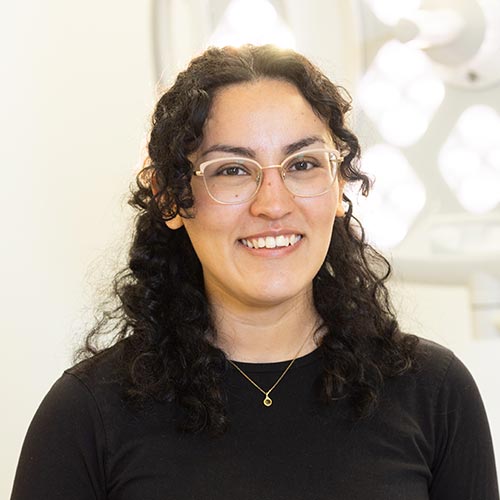

Gabriela Gonzalez Villacorta received her Bachelor of Science in Psychology and Neuroscience from the University of Toronto in 2016 and followed up with a Medical Radiation Sciences-Radiological Technology degree in 2019. After working clinically in x-ray and CT departments in the William Osler Health System and Mackenzie Health respectively, she joined the Unity Health Toronto Simulation team in 2023.
Gabriela’s areas of interest include using moulage to improve representation and inclusivity in simulation with a focus on race, sex and gender.
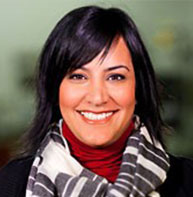

With over 20 years of experience in hospitals and academic settings, Nazanin is a Registered Nurse and education leader. She holds a Bachelor of Science in Nursing, Education degrees, and an MBA in Healthcare. She has also received specialized training in simulation and business from Harvard Medical School and advanced executive leadership training at the Smith School of Business at Queen’s University. Additionally, she has earned multiple postgraduate diplomas in education, simulation, executive leadership, technology, and AI-enabled learning.
Currently, Nazanin serves as the Director of Simulation and Technology-Enabled Education at Unity Health Toronto. In this role, she provides strategic and operational oversight for the Simulation, Digital Education, Health Information, and Knowledge Mobilization Programs.
Simulation education has been a cornerstone of her healthcare and academic career. Nazanin has acted as a subject matter expert, auditor, and program evaluator for simulation programs on both national and international levels. She has delivered numerous presentations and workshops and has mentored and trained healthcare professionals, simulationists, educators, and leaders on Canadian and global platforms.
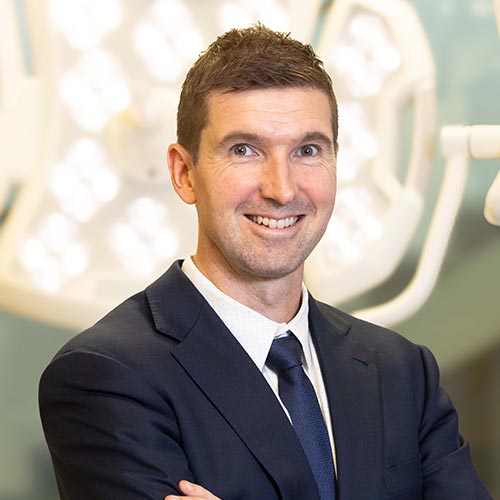

Dr. Petrosoniak is an emergency and trauma physician practicing at St. Michael’s Hospital, Toronto. He was the inaugural lead of translational simulation at Unity Health Toronto, a first-of-its-kind role in Canada that combines systems thinking and simulation to improve systems-level decision-making, clinical design and patient outcomes. He's now transitioned to Medical Director for the Simulation Program, combining his interest in educational initiatives and patient safety/quality improvement-related simulations. As a clinician educator, he leads regular simulation training in critical care skills for staff emergency physicians and residents. He is also a member of the steering committee for provincial standards for the care of bleeding patients.
In addition to his simulation and clinical roles, he is an Assistant Professor of Emergency Medicine in the Department of Medicine at the University of Toronto and a Clinician Educator and Associate Scientist with an appointment at the Li Ka Shing Knowledge Institute. Dr. Petrosoniak has several clinical and academic interests, including trauma resuscitation, massive hemorrhage protocols and simulation to improve clinical care, high-stakes decision-making, and infrastructure design. He has received >$300,000 in grant funding to support this work and published >50 peer-reviewed publications, editorials and scientific abstracts. He is regularly an invited speaker at national and international conferences.
When he's not working, he can be found driving his daughters to their dance competitions and cheering for the Toronto Raptors.


Kristen joined the simulation team in 2017. Her passion for simulation dates back many years to integrating moulage and detailed patient histories while teaching BLS and lifeguarding. Having completed more formal education, she has redirected her goals towards applying simulation to improve patient care through education, quality improvement, research, and human factors. As a Simulation Educator, she works with faculty to develop and continuously improve simulation activities using best practices. This includes writing objectives based on needs, designing dynamic scenarios, and facilitating engaging debriefs. Kristen is also a Respiratory Therapist, who derives great satisfaction from a good, productive suction. She previously completed her BSc in Biochemistry, and looks forward to never setting foot in a lab again.


Hentley has diplomas in Journalism and Electronics Engineering Technology and previously worked as a manikin service technician on the bench and in the field.
He has been in simulation for over 20 years and brings a wealth of knowledge from the technical side to the Sim team. His responsibilities include setting the simulation environment for learners and facilitators, and maintaining the simulation equipment. On occasion he also lends his technical expertise in areas of manikin maintenance and scenario programming.
He has a passion for helping learners enhance their competency and enjoys seeing their progression.


Sue joined the simulation team in 2013, serving as a Simulation Specialist. Her educational background includes formal training in interior design (1991), and certifications in Human Service Worker Certificate (1992), Health Care Aide (1994), Adult Education/Staff Training (2017) and Teaching and Learning for Collaborating (2017). Most recently, Sue completed her Master of Health Sciences in Translational Research at the University of Toronto (2000), equipping her with advanced skills to identify and address gaps in the healthcare system and implement innovative, user-centric solutions to enhance patient care.
Sue has presented at international simulation conferences, won Best Interactive Poster Presentation Award for her poster on Resuscitative Hysterotomy at SimGhosts in (2019), and enjoys leading interprofessional educational sessions in the sim lab. Passionate about enhancing the learning experience, Sue creates realistic training models, including cricothyroid and invasive placenta simulations.
Outside the lab, you’ll find Sue either spending time with loved ones, walking her Aussiedoodle, or paddle boarding.


Camille is a registered nurse who has been working at St. Michael's Hospital since 2019. She has a Bachelor of Health Sciences from Western University and a Bachelor of Science in Nursing from Queen's University, where she was first exposed to simulation. After working clinically for a number of years, she quickly sparked an interest in education and leadership, and completed a Master of Nursing in Leadership and Professional Practice in 2022. She has always been passionate about teaching, health promotion, and improving patient care through simulation. Camille joined the Allan Walters Family Simulation Centre in March 2023 and is excited to be a part of such an incredible team. As a Simulation Educator, she works with users to plan and develop simulation activities in the areas of education, research, quality improvement and translational simulation.


Mark has been an emergency nurse for more than 2 decades in the ED at St. Michael’s Hospital. He has filled several roles intermittently at Unity Health, such as a Clinical Specialist for the IT department, a Case Manager for the General Internal Medicine Team, the interim Clinical Leader/Manager in the Emergency Department and as the Resource Nurse in the ED. In addition, he has been a faculty member of the Advanced Trauma Care for Nursing course program at Unity Health since 2006. In 2023, Mark joined the Simulation Team in the role of Simulation Educator.


Julia is a proud respiratory therapist who has worked in various education, research, operational readiness and patient and family engagement roles at Unity Health Toronto since 2005. She joined the simulation team in early 2023 as a Simulation Educator. This role allows her to combine interests in person-centred care, evidence-based and equity-focused practice to improve simulation within Unity Health Toronto and beyond. She enjoys working collaboratively with users to help improve healthcare delivery and outcomes. In addition to simulation activities for education, research, and quality improvement, Julia supports the translational simulation program, which enables the design of better healthcare spaces, policies and workflows.
Outside of work you will find her spending time with her loved ones, playing various sports or binge watching a reality TV show.

